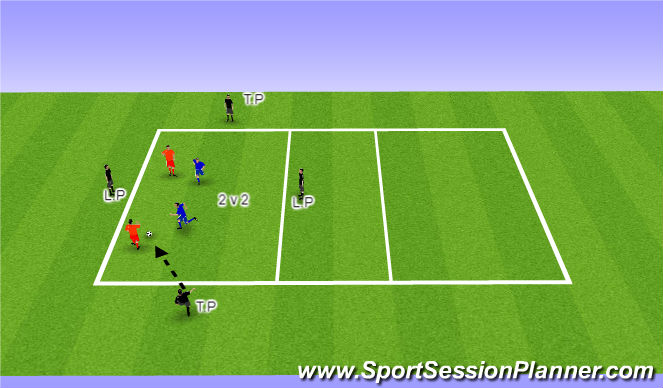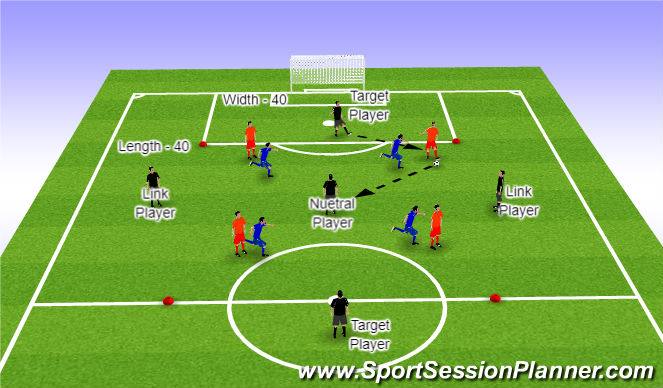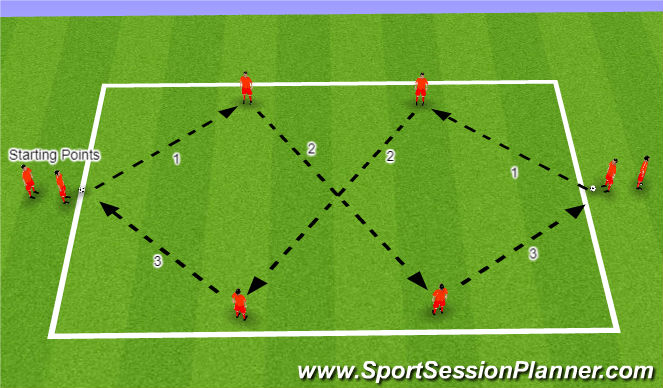Football/Soccer Session (Academy Sessions): Breaking Lines

Profile Summary

| Name: | Andrew Wenzel |
|---|---|
| City: | Newport |
| Country: | United Kingdom |
| Membership: | Adult Member |
| Sport: | Football/Soccer |
Description
Part of a series of sessions on Building Up Play.
L.O
- Creating Angles to Recieve
- Creating space through width & depth
- Playing through pressure

See the guidance at the top of this page to understand why you are not seeing interactive Football/Soccer images.

2v2+2 (15 mins)
Organisation
2 Groups. min of 6 (2v2+2)
Drill is about passing and moving and creating angles to recieve so can't be 1v1. min 2v2.
2 Target Players.
Then any spares as Link Players
Turnover Ball - Attack whichever target player (closest).
Straight from the start players can step in with the ball when they play a pass to a TP/LP
- Free Flowing
Coaching Points
- Creating space w/ Width & Depth Principles.
--> Sometimes to get the ball we have to go away from the ball (Create Space, Don't Kill it)
- Angles to recieve
- M.B.Q (Passes & Dribbles)

See the guidance at the top of this page to understand why you are not seeing interactive Football/Soccer images.

4v4+5 (25 mins)
Organisation
Pitch Dimensions 50 Width (Taken down to 40 to cut out wide spaces, 5 either side)
Half Pitch Length 40 - Stays the same if room available.
'Half Pitch Practice'
Players are trying to transition the ball from one target player to the other target player.
Idea is that players are playing though the 2-1-2 formation through the neutral player (Pivot)
from GK - ST (Target Players) Utilising Wingbacks (Link Players).
Turnover Ball - The team who has it finds their STARTING tareget player.
Score Point - Play to opposite team and build up play.










 Play animation
Play animation Play step-by-step
Play step-by-step Repeat (toggle)
Repeat (toggle) Full Screen
Full Screen Pause
Pause Stop
Stop
Pattern (10 mins)
Organisation
Minimum of 8 Players
Any additional players behind the starting points
If 16 Players then you can use 2 groups
Players follow their pass through the passing pattern
completing pass 1, 2 & 3.
The idea is that the passing pattern not only works on the coaching points of the drill, but it can also be realistic to a pattern on the pitch. A pattern realistic to plying out from the back.
The boys will hopefully see this pattern is realisitic to a game and the way that we want to play.
So,
Pass 1 can be a pass from CB/GK to FB
Pass 2 can be a pass from FB through to MF
Pass 3 can be pass from MF through to ST
and then the cycle re-starts and it again becomes Pass 1 again.
Coaching Point 1
Movement to recieve
- Trigger to Move
Q:When is the trigger to move (just like when we are talking about playing out from back)
As soon as head comes up and team-mate is looking to play the pass - thats when we make our movement (we make it as late as possible Q: WHY? A: Difficult to mark)
- Peeling away (sharp movement)
- Communicate it! ('YES!')
Coaching Point 2
Creating angles to recieve (body positioning - half turn, back foot - reciving to play forward
P1: Challenge the players to recieve the ball in different ways (not just on the back foot)
First touch inside / touch inside with a skill
- Still need to maintain the movement (sharp) to recieve
- Don't get unrealistic with how we recieving it
(challenge yourself with testing skills, but don't be stupid)
--> Can we think about how we would recieve it in relation to our positionon the pitch
FB: might be a lot more recieving on the back foot.
W: we might add in more of a skill (because we're in the final 3rd)
CM: we might want to do both as theres lots of different situations as a CM
We talk a lot about being able to recieve on our back foot. Its an important skill to master as it allows to recieve from one side and go out the other quickly (don't need to take the extra touch to shift it, we can just open and play).
But then there are times we may need to take the ball on our front foot
Q: What situations might they be?
A1: Playing against pressure from side or behind (prevents oppening out).
A2: You may need to play directly forward.
You may see a something (a pass/space to exploit/ shot/ cross) ahead of you.
P2: Double movement away from our defender to be difficult to mark
Q: What could we do to be difficult to mark (apart from the sharp movement)?
A: Double movement